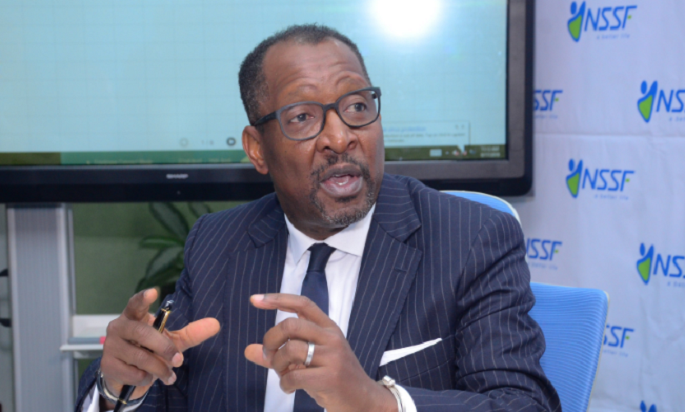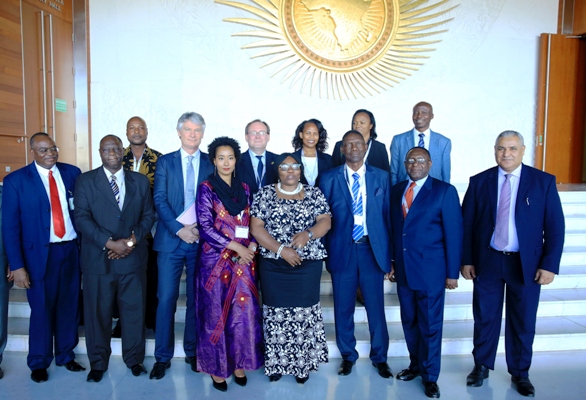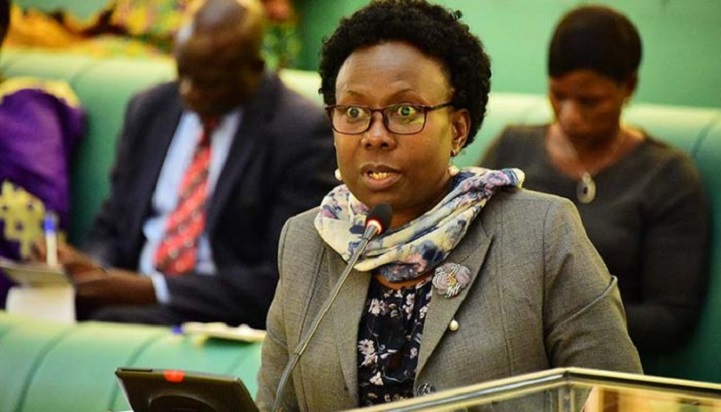NSSF MD Richard Byarugaba
A consensus has been reached on the midterm access for Ugandans aged 45 and have saved with the National Social Security Fund (NSSF) for 10 years, but contention still remains on who should supervise the fund.
Different stakeholders including the Ministry of Finance and planning, the Gender committee of Parliament, worker’s representatives and Trade unions among others have come to agree that restricting the fund to Ugandans who are 45 years old and have saved for 10 years is affordable. However, there is still contention on who should supervise the funds between the Ministry of Finance and the Ministry of Gender, Labour and Social development.
Although the NSSF which has assets worth 15 trillion is regulated and supervised by the Ministry of Gender, the new proposal seeks to have the fund under the supervision and management of the Ministry of Finance.
The two Ministries of Finance and Gender have both made their case on why the fund should be under them, while workers’ representatives have said perhaps there should be a dual management of the fund. When he appeared before the committee scrutinizing the NSSF bill, Minister of Finance in charge of Planning Henry Musasizi said that the fund should be under them since they manage finances and are better placed to oversee it.
The Gender Minister Betty Amongi emphasized in a closed door meeting with the committee members that the fund should be under them since it is for social protection.
Now even as the committee finalizes its report on the bill, the matter of the management of the fund still remains contentions.
Muwanga Kivumbi, the Butambala MP says that allowing the management of the fund to go to Finance would mean finance can easily access this money and this is dangerous looking at the state of indebtedness. He says what needs to be looked at is the overall efficiency of NSSF and the policy, but the current fight for control is for Ego. He says the funds is subject to abuse, if it is taken to Finance.
He says although the Gender Ministry seems to want to retain the management of the funds because of the social aspect, the issue of their capacity to run the funds is also a question.
The Civil Society Budget Advocacy Group (CSBAG) state that since NSSF is meant to provide social security to workers in the private sector, it should be left under gender which is mandated to by law to do so.
Julius Mukunda the Executive Director of CSBAG states that if NSSF was meant to act as an economic tool for economic development, it would have gone to the Ministry of finance, but the Ministry of Gender Labour and social development understands the social issues of the country.
He says unfortunately Finance will want savings to remain for investment, while the Gender Ministry understands the problem of Ugandans, work and retirement.
He says taking the funds out of the current Ministry completely renders the Ministry without a role.
Grace Mukwaya Lule of the Executive Director Platform for Labour Action that is focused on protecting and promoting rights of workers says that since these are worker’s savings, and not some investment projects, it should remain in the Ministry of Gender.
“Gender is supposed to be taking care of workers interests, and not investments, and the savings are definitely workers interest. The savings of workers are not finances of the country,” says Mukwaya.
Dr. Joseph Muvawala the Executive Director National Planning Authority (NPA) says that when he looks at the impact that NSSF puts on the economy, it should be in Finance. He says NSSF is part of the financial system of the country, and simply not a social issue.
Paul Omara Otuke, the Otuke County MP, a former banker and development economist says that looking at the amount of money in NSSF, it should not be under the watch of the Gender Ministry, as Ministry of Finance has the appropriate expertise. He says the NSSF money can be used to build the economy which is not a bad thing.
He says there are laws Government how NSSF should work including asset portfolios, how much can be invested among others.
–URN





